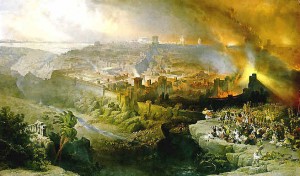 Ever wonder what’s wrong with the world? Here’s the answer from a kingdom perspective. I will have to give it to you in two installments to keep below my goal of no more than 500 words per post. Just consider it like the book-of-the-month club, except it’s a blog and not books, but pages, and you get the installments in days not months.
Ever wonder what’s wrong with the world? Here’s the answer from a kingdom perspective. I will have to give it to you in two installments to keep below my goal of no more than 500 words per post. Just consider it like the book-of-the-month club, except it’s a blog and not books, but pages, and you get the installments in days not months.
The world God created was a pretty cool place. It was a place of beauty, peace and prosperity. God created for man a garden that was beautiful and bountiful, containing trees of every kind, bearing every kind of fruit. (Gen. 2:9). There was a river running through the garden, providing a convenient, endless supply of fresh water. (Gen. 2:10). There was also an abundance of precious gems and metals. (Gen. 2:12). This was kind of like living next door to a grocery story, jewelry store and art gallery where everything you wanted was free.
There is no record of any natural disasters in or around the garden—no earthquakes, tornadoes or violent storms. You wouldn’t have had to worry about Giraldo Rivera showing up with a crew to shoot the hurricane or flood. Man gathered fruit and vegetables easily without contending with weeds, thorns or disease. God created animals for man and brought them to him to name, presumably so the animals would know to come when man called them. (Gen. 2:18-20). It was like a zoo without the need for cages Man was at peace with his environment, surrounded by beauty and abundance, and by any definition of the word was wealthy.
Things were going pretty well for Adam, but being a single, successful guy was still not completely fulfilling. So, God hooked him up with a gal named Eve, and the two of them started the world’s first nudist colony,… sort of. They had the perfect relationship, free of strife, hurtful words and selfishness, and they loved one another unreservedly. They suffered from no disease or sickness, emotional or mental problems. They were completely secure with who they were and who God had created them to be.
God gave what he created the cosmic seal of approval, calling it very good. (Gen. 1:31). It was so good God intended it last and that man export it to the rest of the world. After placing Adam and Eve in the garden, God blessed them and instructed them to “…fill the earth, and subdue it.” (Gen. 1:28). The Garden of Eden would have functioned as a reference point to which man could always return to view the blueprint for the world. At this point, things were looking pretty good. You think you know what went wrong? Tune in for part II tomorrow. There may be more to it than you thought. GS




